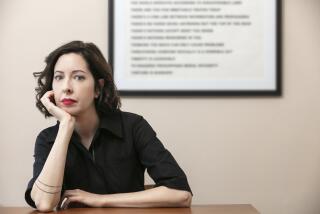Book Review : Probing a Fictional/Real Family’s Universe
- Share via
Hubble Time by Tom Bezzi (Mercury House: $16.95; 255 pp.)
In a beautiful, aging Moorish apartment house in Hollywood, a single lady named Jane writes her life away. She has been married, was divorced, keeps her journal but longs to really write, really love. She seems paralyzed by fear, lack of self-esteem, by the gray chains of the past. Jane’s mother has killed herself.
Her father, Cliff, a second-rate professor, has run off with a “hair-sprayed Christian” student. Jane finds her father loathsome, both for his instability and his lack of accomplishment. She hates him but knows she’s very much like him because she too “contents” herself with a job that’s far below her talents and swims and sails only because her father is so terrified of freeways he can scarcely drive.
A Famous Grandfather
Hiding fear behind a critical facade, overcompensation for a perceived lack of love by accomplishing things we impose upon ourselves and then take no pleasure in--all of these would be fairly conventional in a novel, predictable, even, except that Jane has an illustrious grandfather, Edwin Hubble, a famed astronomer who discovered the galactic structure and the expansion of the universe, so that while Jane is crippled by the depressing example of her own, failed dad, she’s hypnotized, inspired, bemused by another entire model of behavior:
What if, instead of sneaking beers and vomiting some fear, and blaming everyone else for your own grief, you lived happily in a long and stable marriage, spent weekends at Anita Loos’ beach house, had Aldous and Maria Huxley over for dinner and traded badinage with Albert Einstein himself? No wonder Jane can’t do anything but take long, lonely swims and journey daily to her meaningless job. She has far too many role models: if she’s horrified by her family vision of failure, she’s equally terrified of living a truly expansive life.
There’s a technical problem or challenge here. There was a real Edwin Hubble and he had a real wife, Grace, whose elegant journals about their daily life are here extensively quoted. But the Hubbles appear to have had no children. The wretched father of Jane is a product of fiction, as is Jane herself. This matrix is interesting to try out as a novelist, but it (A) has some glitches and (B) raises some very profound questions that the author doesn’t care to address.
In the glitch category, nowhere does Jane’s elegant grandmother ever refer to her son in her journals, and not until the very end does the author bother to make it clear--are Grace and Edwin Hubble imagined to be the parents of Cliff (that unappetizing, fearful drunk) or his deceased wife, who, outside of parking her car on some train tracks, appeared to be a woman of prudence and style?
In the “profound question” category, why would a shining, loving, accomplished couple like the Hubbles spawn such a dithering failure as Cliff? Is this what success means? Is this, indeed, what the “expanding universe” implies in human terms--that if one human being expands in wisdom and happiness, everyone else around him must contract in ignorance and fear?
Imagined Glamour
Once you stop wishing this peculiarly unique novel had done what it hasn’t done, you begin to admire what it has done. Jane, so isolated, so fearful, so critical, so--in her own term--”negative,” is held in thrall by the imagined glamour and intensity of her grandparents’ life. It is not just Edwin’s scientific contribution that fascinates her, but the sense of the past that has occurred all around her--out at the beach where Christopher Isherwood used to stroll with her grandparents, or over at the Huntington Library, where every day at 3:30 her grandmother walked, or up on Sunset Boulevard where Bette Davis kept her apartment.
There was a time, frets Jane, when life was measured and in good taste, where people made good conversation (how could they not, being Anita Loos and Aldous Huxley), where people stayed married until they died, where people loved each other.
The two journals (one real, one fictional; one Grace Hubble’s, one from the fictional Jane), run parallel and overlap. Jane can’t help but see that however much she admires Grace, there are some depressing things to this life lived entirely for another. When Edwin leaves in World War II, Grace suffers severe depression.
Parasites or Satellites?
She designates all women as either “parasites or satellites,” and as a satellite , she suffers deeply when the center of her personal universe vanishes. (Maria Huxley too devoted as she is to Aldous, suffers from lassitude, a sense of futility and cries in her bath.)
The great thing would be to be Hubble himself; to stay up all night, to study, to design the 200-foot telescope on Mt. Wilson, to discover the nature of the universe and to leave the moping to somebody else. To expand , to rejoice, to love oneself with the same shining, impersonal regard as the universe itself; that’s the possibility this book raises, and in its intense, quirky scholarship and examination of our most nagging neuroses, certainly a solid accomplishment.
More to Read
The biggest entertainment stories
Get our big stories about Hollywood, film, television, music, arts, culture and more right in your inbox as soon as they publish.
You may occasionally receive promotional content from the Los Angeles Times.










